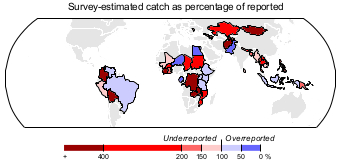News
A safety net to halt the decline of biodiversity
A ‘safety net’ made up of multiple, interlinked and ambitious goals is needed to tackle nature’s alarming decline, and no single goal can capture the broad range of characteristics that need to be sustained. These were the conclusions of a large international team of researchers under the auspices of the Earth Commission and that included bioDISCOVERY SSC co-chair Lynne Shannon, SSC members David Obura, Paul Leadley, Jeannine Cavender-Bares, and Bernardo Strassburg as well as Cornelia Krug.
None of the of its 20 Aichi Biodiversity Targets for 2020 has been reached, as the Convention on Biological Diversity (CBD) recently announced. Policymakers, scientists and country negotiators are now preparing for the next generation of biodiversity goals for 2030 and 2050, to be enshrined by their 15th Convention of the Parties in 2021.
Analysing the new goals for nature currently being drafted by the UN’s Convention on Biological Diversity, the researchers outline the scientific basis for the biodiversity goals Ecosystems, species, genetic diversity and nature's contributions to people all need distinct goals, and these need to be interwoven, providing a safety net for nature.
Led by Sandra Diaz, the paper provides a comprehensive assessment of is the scientific evidence supporting each goal, how these goals reinforce or undermine each other, and whether one aspect of nature could serve as a shortcut for others. Three points are critical and need to be taken into consideration by nations in the development of the new Global Biodiversity Framework:
First, a single goal for nature, based on a single facet, for example, focused only on species extinctions, or ecosystem area, similar to the ”below 2°C” target for climate, is risky. Multiple, distinct goals are needed for ecosystems, species, genes and nature’s contributions to people to make sure none of them falls through the gaps. Second, as the facets of nature are interlinked and affect each other for better or worse, the goals must be defined and delivered holistically, not in isolation. Third, only the highest level of ambition for setting each goal, and implementing all goals in an integrated manner, will give a realistic chance of “bending” the curve of nature’s decline by 2050.
The paper also distinguishes between low and high ambitions, and gives examples how high ambitions could be achieved. Underscoring the general recommendations, the researchers have produced a checklist of key science-based points that negotiators could use during the upcoming negotiations of the final text of the new biodiversity goals.
Díaz, S., Zafra-Calvo, N., Purvis, A., Verburg, P.H., Obura, D., Leadley, P., Chaplin-Kramer, R., De Meester, L., Dulloo, E., Martín-López, B., Shaw, M.R., Visconti, P., Broadgate, W., Bruford, M.W., Burgess, N.D., Cavender-Bares, J., DeClerck, F., Fernández-Palacios, J.M., Garibaldi, L.A., Hill, S.L.L., Isbell, F., Khoury, C.K., Krug, C.B., Liu, J., Maron, M., McGowan, P.J.K., Pereira, H.M., Reyes-García, V., Rocha, J., Rondinini, C., Shannon, L., Shin, Y.-J., Snelgrove, P.V.R., Spehn, E.M., Strassburg, B., Subramanian, S.N., Tewksbury, J.J., Watson, J.E.M., and Zanne. A.E. (2020). Set ambitious goals for biodiversity and sustainability. Science 370:411-413
World Biodiversity Forum - Call for Sessions and Workshops now open
Join us for the World Biodiversity Forum 2020 and explore the future of biodiversity.
We welcome for instance contributions that
- Reflect on the importance (and benefits) of biodiversity for human wellbeing, and the value and impact of biodiversity research for society
- Reflect on the responsibility and accountability of the different sectors and societal actors in regard to the conservation of biodiversity
- Identify what is needed to successfully implement/use current knowledge on biodiversity and ecosystem function.
- Identify best practices for generation of products and services for different sectors and societal actors, including corporations.
We encourage sessions that cut across disciplines, cover a diversity of perspectives and visions and address current topics in novel ways.
We accept proposals for thematic sessions and interactive workshops.
Deadline for submission is 21 July 2019.
"Hidden Harvest" - study reveals underreported inland fisheries catch and its contribution to food security

A study by Etienne Fluet Chouinard, graduate student of bioDISCOVERY SSC member Peter McIntyre, reveals a "hidden harvest" in inland fisheries. Due to inadequate monitoring and reporting, inland fisheries catch is underestimated in many countries. While this means that many more people can meet their protein needs than previously thought, information is lacking to make informed management decisions or estimate the pressures freshwater fish stocks are under.
University of Wisconsin Press Release
Scenarios Summer School
Summer school workshop: Models and Scenarios of Biodiversity and Ecosystem Services
11 – 15 June 2018, Continental Park Hotel, Lugano, Switzerland
Scenarios are a systematic way to explore possible futures, and to evaluate policy and management interventions. Models are robust tools to compare the outcomes and impacts of the scenarios explored and can serve as a basis for action.
Goals of the workshop:
- Introduce the participants to the various tools and approaches used in scenario development
- Provide an overview over the different purposes, contexts and scales of modelling and scenario use and application, and enable students to select appropriate scenario designs for specific contexts and diverse scales
- Introduce methods and techniques used in evaluating processes and outcomes from scenarios and equip students with the skills to evaluate scenarios and processes and outcomes from scenarios.
Lecturers:
William Cheung, University of British Columbia, Vancouver, Canada
Simona Pedde, Wageningen University, Wageningen, The Netherlands
Isabel Rosa, Martin Luther University Halle-Wittenberg and German Centre for Integrative Biodiversity Research (iDiv) Halle-Jena-Leipzig, Germany
Osamu Saito, IAS, United Nations University, Tokyo, Japan
Programme and more information here: Summer School Programme (PDF, 100 KB)